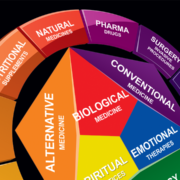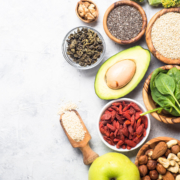Why Each Patient Requires a Different Diet
When it comes to health, no one size fits all. The same is true for diet. What we put into our bodies is as important as the medicines we take or the treatments we receive. So why wouldn’t we want to choose foods that are most compatible with our unique physiology?
One of the ways we support our patients is by helping them select an appropriate diet. By running compatibility tests through bioresonance, we can see which diet best ‘matches’ each person.
Let food be thy medicine and medicine be thy food.”
– Hippocrates
The Importance of Diet
Of course, there are some basic tenets of diet that we should all follow, including eating real food with minimal ingredients, choosing quality fruits and vegetables that are fresh and organic, and eating meals that are satiating so that we stick to our diets.
But the goal of your diet during treatment is to bring your pH to a neutral level – not too acidic and not too alkaline. However, this will look different in each patient. We base each patient’s individualized diet on the input from a full workup and compatibility testing.
While we do have general guidelines for which foods to eat and which to avoid, we find it much more beneficial for patients to adhere to one of 13 potential diets that show the most promise for several conditions.
Although the diet plan may seem strict, we want you to establish and maintain a healthy relationship with food while understanding the fundamental importance of sticking to the dietary guidelines.
Food is not just ‘calories,’ it is the essence of energy production, the immune system, organ function, tissue repair, and even cognition.
So, read on for brief descriptions of the diets that we commonly recommend at NYCIM.
Ketogenic Diets
Ketogenic Diet
The ketogenic diet is a very high-fat, low-carbohydrate diet that was first developed to treat epilepsy in children. This diet has soared in popularity in recent years due to its promises of weight loss, improved mental function and clarity, and anti-inflammatory properties of the diet. A strict ketogenic diet entails 90% of total caloric intake from fat, 6% from protein, and 4% from carbohydrates. However, a more moderate ketogenic diet will incorporate as much as 10% of calories from carbohydrates.
Technically speaking, the ketogenic diet is a form of fasting, in that the organs of digestion are forced to use fat as fuel, and create ketone bodies that become the primary source of energy for the brain. As ketone bodies have a neuroprotective impact on degenerating brain cells, the diet has been extensively evaluated for treating epilepsy, Alzheimer’s disease, and certain cancers. Like many restrictive diets, the ketogenic diet requires strict medical oversight to curb any side effects or nutrient deficiencies.
Pescatarian Keto
As restrictive as the ketogenic diet may be, there are some individuals who will benefit even further from restricting all land-dwelling animals, such as poultry, pork, and red meat. Cue pescatarian keto.
As the name implies, this version of keto sources most calories from dairy, eggs, and fatty, cold-water fish, including salmon, herring, sardines, mackerel, and cod. These are among the leanest protein sources available and contain a number of nutrients including vitamin D and omega-3 fatty acids.
Keto has shown the ability to lower LDL cholesterol, improve insulin sensitivity, treat many cancers, aid with weight loss, slow the progression of neurological disorders, and decrease widespread inflammation.
Vegetarian Keto
Combining the health benefits of the vegetarian diet with the ketogenic diet results in a uniquely anti-inflammatory eating pattern that may be beneficial for numerous health conditions.
As many vegetarians avoid meat and fish but eat eggs and dairy, protein isn’t usually a problem. However, stricter vegetarians will rely on alternate protein sources such as grains, seeds, and legumes for essential amino acids. While fat is typically obtained from full-fat dairy, extra virgin olive oil, coconut oil, avocado, nuts, and seeds.
Vegan Keto
Is it possible to eat a fat-based diet strictly from plants? Well, the Vegan Keto diet does just that, and quite effectively. As vegans have a 75% reduction in their risk of high blood pressure and a nearly 80% lower risk of developing type 2 diabetes, it’s no surprise that the convergence of these two diets will lower inflammation, stabilize blood sugar, and improve cholesterol.
Most vegans rely on grains, seeds, and legumes for protein, but these are generally high in carbohydrates. So, for vegans to reach ketosis, they must rely on high-fat, plant-based products like coconut oil, extra virgin olive oil, avocados, and seed and nut butter.
However, it’s possible to become deficient in essential amino acids on a vegan diet, so followers should be sure to include full-fat tofu, tempeh, leafy green vegetables, berries, plenty of herbs and spices, and nutritional yeast.
Whole Food Diet
Paleo Diet
Modeled on the Paleolithic era, the paleo diet consists of all the foods that could be easily hunted or gathered. Despite the common misconception that this diet includes copious amounts of meat, the paleo diet is centered around lean meats, fish, fruits, vegetables, nuts, and seeds. The biggest difference between a paleo diet and a modern diet is the exclusion of dairy products, legumes, and grains, foods that we only began cultivating 10,000 years ago.
In clinical studies, the paleo diet demonstrated the ability to reduce the risk of cardiovascular disease and type 2 diabetes while improving fat mass and metabolic health.
Whole30 Diet
The Whole30 diet is less of a diet than it is a month-long dietary intervention. It focuses on removing common trigger foods, such as sugar and artificial sweeteners, grains, dairy, legumes, eggs, and alcohol. Whole, unprocessed foods with minimal ingredients should be the focus, including meat, seafood, eggs, vegetables, natural fats, and herbs and spices, while also avoiding many seed and vegetable oils.
After 30 days, one can reintroduce food groups at three to four-day intervals to watch for reactions. This plan also entails eating three meals per day without snacking.
Mediterranean Diet
The Mediterranean is without a doubt the most studied and observed diet of all time. It is simple, inclusive, and clinically backed.
With olive oil as the main source of added fat, the Mediterranean diet is highly plant-based, including whole grains, fruits, vegetables, legumes, nuts and seeds, and moderate amounts of fish. Eggs, milk, and lean meat are rarely consumed, while processed red meat and sweets are largely avoided.
The Mediterranean diet is associated with reducing lowgrade inflammation, protecting cardiovascular and cerebrovascular health, reducing the risk of diabetes, and preventing certain cancers.
Vegetarian & Vegan Diets
Vegetarian Diet
There are many flavors of the vegetarian diet, but they typically exclude meat most of the time, though some consume it occasionally. Others may eat white meat but not red meat, or only eat fish and seafood, dairy, and eggs.
As it is rooted in fruit and vegetable consumption, vegetarian diets are rich in antioxidants, phytonutrients, and fiber, all of which contribute to a reduced risk of cardiovascular disease, lower body weight, improved blood sugar, blood pressure, cholesterol, and triglycerides.
Vegetarianism will also lower one’s intake of saturated fat (fats solid at room temperature) and increase fiber consumption, which will change gut bacteria and may improve gastrointestinal conditions.
Vegan Diet
Technically a subset of vegetarianism or “strict vegetarianism,” veganism entails abstaining from all animal products, including dairy, eggs, seafood, and even honey. The vegan diet is centered around grains, legumes, beans, tubers, root vegetables, and fruits, though certain variations entail eating only raw foods, only fruits, or only vegetables.
Vegan diets have demonstrated efficacy in reducing the risk of heart disease, improving cholesterol, blood pressure, blood glucose, and even cancer. Well-constructed vegan diets will provide adequate intake of B vitamins, minerals, protein, and essential fatty acids.
Pescatarian Diet
Plant-based diets are linked with a reduction in all chronic diseases and overall mortality, as they provide ample amounts of magnesium, potassium, vitamin K as well as antioxidants, phytonutrients, and fiber. Yet, when practiced for long periods, certain individuals are more prone to deficiencies in vitamin D, calcium, B vitamins, and omega-3 fatty acids.
Fortunately, the pescatarian diet incorporates plenty of fish and seafood and may include dairy and eggs. These foods fill in the nutritional gaps of a vegetarian diet and confer important nutrients including vitamin D and omega-3 fatty acids which improve our immune response, reduce widespread inflammation, and even support emotional health and brain health.
Specialty Diet
Low FODMAP Diet
FODMAPs, an acronym for Fermentable Oligo-, Di- and Monosaccharides and Polyols, are believed to worsen gastrointestinal symptoms like cramping, bloating, and diarrhea. The Low FODMAP diet entails limiting the consumption of all gluten and dairy, certain fruits, vegetables, legumes, whole grains, and most sweeteners, including honey–a FODMAP-containing food.
The Low FODMAP diet is a conventional intervention for irritable bowel syndrome, irritable bowel disease, and for improving abdominal pain, bloating, and stool frequency.
Carnivore Diet
The carnivore diet is a form of the ketogenic diet that entails eating only meat, fish, eggs, and some animal products. Based on the theory that humans only recently introduced carbohydrates into our diet, the carnivore diet removes all fruits, vegetables, grains, legumes, nuts, and seeds.
It has recently soared in popularity for the theory that it may prevent insulin resistance and type 2 diabetes and promote weight loss, as it removes all foods with a glycemic index, even herbs and spices.
Schnitzer Diet
The Schnitzer diet is a vegetarian-based diet with infrequent meat consumption. Designed around the diets of ancient humans, it is broken down into two diets; one that is highly restrictive and another that is more inclusive.
The stricter version includes only raw fruits and vegetables and absolutely forbids eggs, dairy, grain products, potatoes, sugar, and candies or sweets. One must also consume less than 1500 calories per day. Conversely, the more liberal version includes whole-grain products, potatoes, a limited amount of eggs, some cheese, and dairy products, and it recommends no more than 2200 calories per day.

At Innovative Medicine, we encourage a diet as unique as our patients. By actually evaluating a patient’s state of health and identifying their tailored needs, we can provide the very best diet plan without guessing. It’s a great addition to our personalized treatment plan that we now run on every patient at NYCIM.
Disclaimer: The statements made in this article have not been evaluated by the Food and Drug Administration. Any products or treatments mentioned are not intended to diagnose, treat, cure, or prevent any disease. Please consult a licensed medical practitioner for medical advice.
At Innovative Medicine, we believe in transparency. We want you to know that we may participate in affiliate advertising programs pertaining to products mentioned herein.
See how we can help you restore complete health of body, mind & spirit.
Join our mailing list and receive exclusive offers + information!







Leave a Reply
Want to join the discussion?Feel free to contribute!